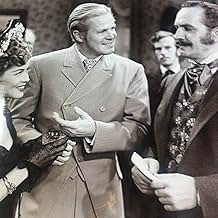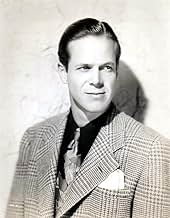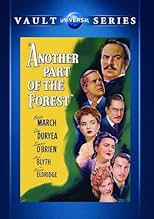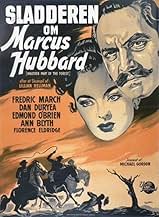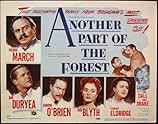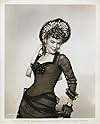AVALIAÇÃO DA IMDb
7,2/10
681
SUA AVALIAÇÃO
Adicionar um enredo no seu idiomaThis 'prequel' to The Little Foxes tells how the ruthless members of the old-South Hubbard family got that way.This 'prequel' to The Little Foxes tells how the ruthless members of the old-South Hubbard family got that way.This 'prequel' to The Little Foxes tells how the ruthless members of the old-South Hubbard family got that way.
- Direção
- Roteiristas
- Artistas
- Prêmios
- 1 vitória e 2 indicações no total
Matilda Caldwell
- Belle
- (não creditado)
William Challee
- Passenger on the Train
- (não creditado)
Edmund Cobb
- Waiter
- (não creditado)
- Direção
- Roteiristas
- Elenco e equipe completos
- Produção, bilheteria e muito mais no IMDbPro
Avaliações em destaque
If you think that the Hubbard's of "The Little Foxes" were decadent , then you will see that they have mellowed , compared to this fantastic prequel , also written by the wonderful Lillian Hellman. The cast works extremely well together . This is the only movie that i know of where Fredrich March plays a villain (Jekyll and Hyde doesn't count) and does he do it to the limit . During a night of musical entertainment in is home, he cruelly insults and humiliates one of his guests, his son's (Duryea) girlfriend, by insinuating that her father played Mozart on a little drum. The girl had said that her father played a little drum and at Duryea's insistence drew attention to Mozart in an attempt to please patriarch Hubbard. The humiliation comes complete with facial disdain and tone of voice that only the cruelest of men could provide . The rest of the family with the exception of Hubbard's wife played by the real Mrs.March (Florence Eldridge) is each in their own way a monster . Edmond O'Brien is wonderful as the "chip off the old block" son , and Dan Dureyea is a great contrast as the half fool and half idiot other son. Ann Blyth who plays daughter Regina is captivating as the only one in the world to whom patriarch Hubbard shows any affection . To state any more of this father daughter relationship would reveal to much of the story in the event you are privileged to see this magnificent film . This film is just one of those cases when a chemistry between the cast was achieved , and the result is riveting . This chemistry is in no small way attributable to the great March , who was able to weave a similar magic in "The Best Years Of Our Lives" . Unfortunately my attempts at seeing this movie again , have failed . It seems as though it has disappeared and if it has , it is a shame . This film is a horror story , where the monsters are human beings . They wear no gruesome masks (exept in one Klu Klux Clan scene) or torment anyone Freddy Kruger style . Their horror and ours , is in men and women's souls .
This is one of the most wicked and dysfunctional families ever to make it to the big screen during the 1940s. Of course, by today's standards they would seem a bit tame! This is the same sick, backstabbing, conniving family seen in little foxes. Some of the original actors are here (such as the slimy Dan Duryea) and some new ones are along for the ride (Edmund O'Brien, Ann Blythe and Frederick March). So why did I like the movie? Well, the evilness of the characters and how deliciously they scheme and change sides when it best suits their needs make it a very mesmerizing film. Also, because the schemes change A LOT, it's tough to predict where the movie will end.
This movie, though made AFTER Little Foxes, is the prequel. So after seeing this, see Little Foxes and hold on tight!
This movie, though made AFTER Little Foxes, is the prequel. So after seeing this, see Little Foxes and hold on tight!
Destined for the stage, but somehow ingeniously made into a movie, this heavy drama about an ostracized family and there internal implosion gets better with each passing minute all the way up to its smashing ending. The superb cast includes an impressive list of names, but even the lesser roles (Dona Drake in particular) contribute significantly, while the story is nearly flawlessly presented, with a few touches that take advantage of the cinematic medium, especially a terrifically edited sequence with Drake doing a Can-Can in a dancehall while out in the woods the KKK is beating a carpetbagger senseless. But what gets the most attention is the constant state of maneuvering between three siblings for the father's favor and his money, and the father's utter disdain, brilliantly portrayed by Frederic March, for his two sons, the hardworking Edmond O'Brien and his lazy younger brother played by Dan Duryea. What stands out is the consistent level of fascination and intensity that the film maintains from start to finish, and the fact that it (this film) seems all but lost today.
'Another Part of the Forest' has been compared often inevitably and for good reason to 1941's 'The Little Foxes', a great film with one of legendary Bette Davis' best performances. The reason for the comparison is that this is a prequel to that film despite being made seven years later. It sees a fascinatingly evil and ruthless family and the source material was shocking at the time and with the portrayal of such ruthlessness in just one household still has the ability to shock.
Have actually seen mixed reviews for 'Another Part of the Forest'. It is very positively received here and a number of classic/Golden Age film fans like/love it too. At the same time, there have been criticisms from some critics, mostly trusted ones from personal view but they're not without dubious opinions every now and again, of 'Another Part of the Forest' being static and that the stage origins are obvious. Actually lean more towards the former and it is great to see people here fond of it. To me, it was very good even if there is a preference for 'The Little Foxes'.
The direction could have been sharper in places, parts of it tend to be on the limp side and lacks William Wyler's imaginative use of camera and atmosphere a little.
Did think too that Ann Blyth's acting, though she does absolutely have great moments, didn't quite gel with that of the rest of the cast. She didn't quite seem monstrous enough and could have gone for it more, Davis was so toweringly monstrous in 'The Little Foxes' and there didn't quite seem to be enough here of how the character came to be the way she became.
However, the cast on the most part are wonderful. Fredric March is perfectly cast and he was never more chilling than here. Dan Duryea does calculating in a way that is very sinister and Florence Eldridge is effectively dotty. Edward O'Brien is a great and more sympathetic contrast to March, their conflict is not just ruthless but also very interesting. The father-daughter chemistry also unsettles and although the characters are with few redeeming qualities and very unsympathetic they are interesting and didn't come over as too over-written, motivations take a lot of unpredictable turns but they were at least buyable.
It, 'Another Part of the Forest' that is, moreover looks great. Very sumptuous and atmospheric, with eerie shadowy lighting and elegant costuming and settings. The music is haunting without over-shadowing or being over-bearing orchestrally. The script thought provokes and bites and doesn't feel too overly talky in the way a lot of other stage to film adaptations do, found it quite vicious too. Personally didn't think it was static or stagy at all, the character interactions were very believable, there were tension and chills in the atmosphere, it was darkly dull and it didn't feel that much of a filmed play or get too melodramatic again like some stage to film adaptations do and also considering the subject. If there was an improvement over 'The Little Foxes' it was the ending, it was the one weak spot in that film whereas it was unpredictable and didn't come over as abrupt.
On the whole, very good. 8/10
Have actually seen mixed reviews for 'Another Part of the Forest'. It is very positively received here and a number of classic/Golden Age film fans like/love it too. At the same time, there have been criticisms from some critics, mostly trusted ones from personal view but they're not without dubious opinions every now and again, of 'Another Part of the Forest' being static and that the stage origins are obvious. Actually lean more towards the former and it is great to see people here fond of it. To me, it was very good even if there is a preference for 'The Little Foxes'.
The direction could have been sharper in places, parts of it tend to be on the limp side and lacks William Wyler's imaginative use of camera and atmosphere a little.
Did think too that Ann Blyth's acting, though she does absolutely have great moments, didn't quite gel with that of the rest of the cast. She didn't quite seem monstrous enough and could have gone for it more, Davis was so toweringly monstrous in 'The Little Foxes' and there didn't quite seem to be enough here of how the character came to be the way she became.
However, the cast on the most part are wonderful. Fredric March is perfectly cast and he was never more chilling than here. Dan Duryea does calculating in a way that is very sinister and Florence Eldridge is effectively dotty. Edward O'Brien is a great and more sympathetic contrast to March, their conflict is not just ruthless but also very interesting. The father-daughter chemistry also unsettles and although the characters are with few redeeming qualities and very unsympathetic they are interesting and didn't come over as too over-written, motivations take a lot of unpredictable turns but they were at least buyable.
It, 'Another Part of the Forest' that is, moreover looks great. Very sumptuous and atmospheric, with eerie shadowy lighting and elegant costuming and settings. The music is haunting without over-shadowing or being over-bearing orchestrally. The script thought provokes and bites and doesn't feel too overly talky in the way a lot of other stage to film adaptations do, found it quite vicious too. Personally didn't think it was static or stagy at all, the character interactions were very believable, there were tension and chills in the atmosphere, it was darkly dull and it didn't feel that much of a filmed play or get too melodramatic again like some stage to film adaptations do and also considering the subject. If there was an improvement over 'The Little Foxes' it was the ending, it was the one weak spot in that film whereas it was unpredictable and didn't come over as abrupt.
On the whole, very good. 8/10
I wasn't aware that this prequel had even been made. It helps to be familiar with the later story (filmed 7 years earlier-so Hollywood) and I'm glad I came across it. It has the same general feel as 'Little Foxes', so if you want to see how the older Regina and her slithery brothers got to be the way they were, see this very well acted and written flick.
Você sabia?
- CuriosidadesThe patriarch and matriarch of the Hubbard family, Marcus and Lavinia, are played by real-life husband and wife Fredric March and Florence Eldridge who had previously teamed onscreen in O Crime do Estúdio (1929), Os Implacáveis (1935) and Mary Stuart, Rainha da Escócia (1936), the last-named being Eldridge's most recent screen credit prior to ''Another Part of the Forest''. Subsequently Eldridge and March would re-team in Piedade Homicida (1948) (also starring Edmond O'Brien), Cristóvão Colombo (1949), and - again as married Southerners - O Vento Será Tua Herança (1960), these three films comprising Eldridge's entire cinematic career subsequent to ''Another Part of the Forest''.
- Citações
Marcus Hubbard: Try to remember that though ignorance becomes a Southern gentleman, cowardice does not.
Principais escolhas
Faça login para avaliar e ver a lista de recomendações personalizadas
- How long is Another Part of the Forest?Fornecido pela Alexa
Detalhes
- Data de lançamento
- País de origem
- Idiomas
- Também conhecido como
- Aves de Rapina
- Locações de filme
- Empresa de produção
- Consulte mais créditos da empresa na IMDbPro
- Tempo de duração1 hora 47 minutos
- Cor
- Proporção
- 1.37 : 1
Contribua para esta página
Sugerir uma alteração ou adicionar conteúdo ausente

Principal brecha
By what name was No Caminho da Vida (1948) officially released in India in English?
Responda
